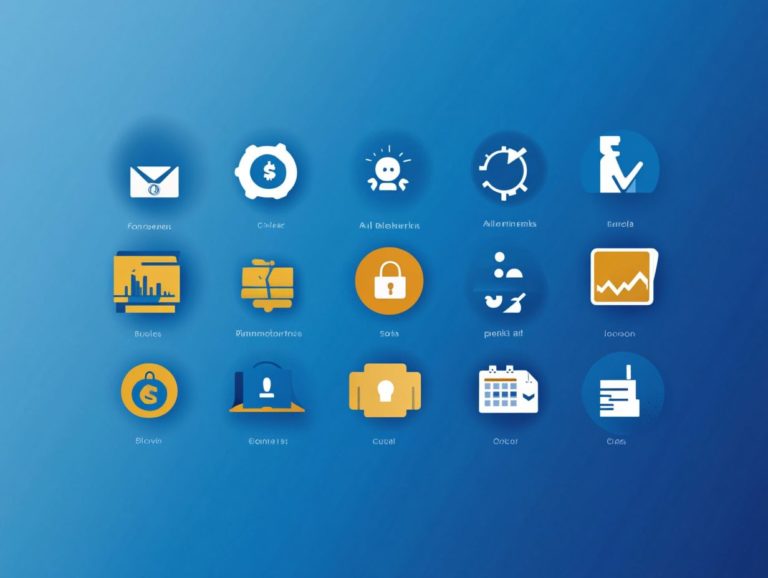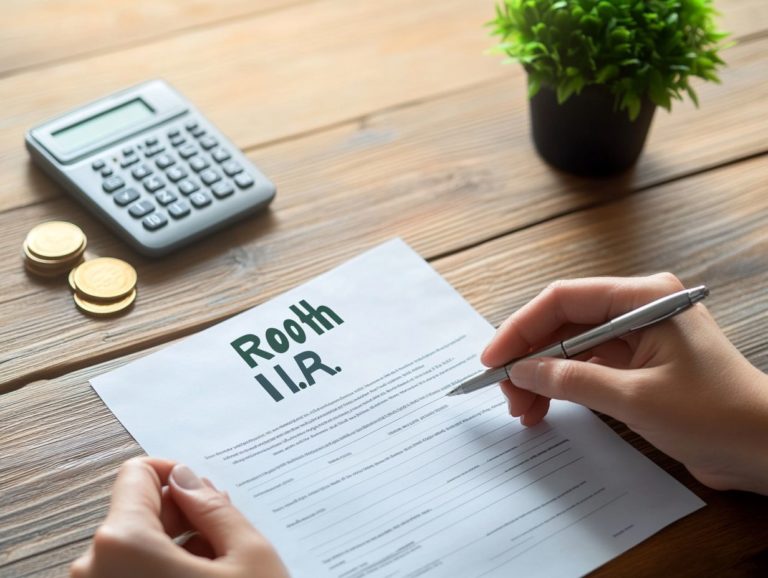5 Tips for a Smooth Retirement Transition
Planning for retirement may seem daunting, but it doesn t need to be.
With the right strategies, you can ensure a smooth and enjoyable transition into this new chapter of your life. This article presents five essential tips that will guide you on the right path, from starting your planning early to determining your personal retirement goals.
You ll discover how to create a realistic budget, prepare for your healthcare needs, and maintain an active and engaged lifestyle during your golden years.
Get ready to forge a fulfilling retirement! Let s delve into these vital steps together!
Contents
- Key Takeaways:
- 1. Start Planning Early
- 2. Determine Your Retirement Goals
- 3. Create a Realistic Budget
- 4. Consider Your Health Care Needs
- 5. Stay Active and Engaged
- What Are the Benefits of Early Retirement Planning?
- What Are the Key Components of a Realistic Retirement Budget?
- How Can One Prepare for Potential Health Care Costs in Retirement?
- What Are Some Ways to Stay Active and Engaged During Retirement?
- What Are the Most Common Challenges in Transitioning to Retirement?
- Frequently Asked Questions
- What are the top 5 tips for a smooth retirement transition?
- How can starting to plan early help with a smooth retirement transition?
- Why is it important to consider your financial situation before retirement?
- What is the benefit of developing a retirement plan?
- How can staying active and connected help with the retirement transition?
- Why is it important to stay informed about retirement?
Key Takeaways:

- Plan for retirement early to ensure a smooth transition.
- Set clear retirement goals to guide your planning process.
- Create a realistic budget to manage your finances during retirement.
- Consider healthcare needs and prepare for potential costs.
- Stay active and engaged in retirement to maintain a fulfilling lifestyle.
1. Start Planning Early
Starting your retirement transition planning early is essential for ensuring a successful and fulfilling retirement. Engaging in proactive financial planning gives you the power to assess your income sources, understand your Medicare and Social Security options, and lay a solid foundation for your retirement goals.
Research from Edward Jones and Age Wave indicates that those who prepare ahead are more likely to enjoy peace of mind and satisfaction throughout their retirement journey.
By exploring various financial instruments like 401(k)s (a retirement savings plan sponsored by an employer) and IRAs (Individual Retirement Accounts), you can maximize your savings potential. Recognizing the importance of estate planning not only protects your assets but also provides clarity for your loved ones.
Early decision-making fosters not just financial security but also emotional readiness, paving the way for a smoother transition into retirement. To enhance this planning process, consider utilizing resources like workshops and personalized consultations with financial advisors.
These tools can offer tailored insights, making your journey toward retirement manageable and profoundly enriching.
2. Determine Your Retirement Goals
Determining your retirement goals is a crucial step that shapes your vision statement and overall experience. This will guide your choices when it comes to hobbies, interests, and travel destinations.
As you explore this journey, it’s important to consider the various aspects of life that retirement brings. Your financial objectives will likely focus on maintaining a comfortable lifestyle while also managing healthcare costs. For effective planning, keep in mind the 5 key factors in retirement planning. Your lifestyle goals might include discovering new places, rekindling long-forgotten hobbies, or dedicating time to volunteer work.
Emotional fulfillment should not be overlooked, as a sense of purpose and connection can greatly enhance your happiness in these later years.
Articulating a clear vision statement helps encapsulate your aspirations, ensuring they resonate with your personal values. By prioritizing activities that nourish your soul such as cultivating new friendships or emphasizing health and wellness you create a more rewarding retirement experience.
3. Create a Realistic Budget
Creating a realistic budget is essential for effective financial planning during retirement, ensuring that your income sources adequately support your daily activities and lifestyle choices.
This involves identifying fixed expenses like housing, utilities, and healthcare costs and accounting for variable expenses such as groceries, travel, and hobbies. It s crucial to consider various income streams, including pensions, savings, and Social Security, as they play a pivotal role in maintaining your financial stability.
Don t overlook estate planning; it s key to managing your assets, minimizing taxes, and protecting your beneficiaries. To keep expenses in check, you can employ tools like budgeting apps or spreadsheets, simplifying the monitoring process and giving you the power to make informed financial decisions.
Don t wait! Start these steps today for a brighter tomorrow.
4. Consider Your Health Care Needs

Considering your healthcare needs is essential for a secure retirement, especially when it comes to Medicare planning. Medicare is a government program that helps pay for health care for people over 65. This aspect directly influences your emotional readiness and overall well-being during this significant life phase.
By understanding the various Medicare options available to you, you can save you a lot of money a major concern for many retirees. Prioritizing taking care of your health early is crucial, not just for your physical longevity, but also for nurturing your mental well-being.
Familiarizing yourself with preventative care options and community programs focused on health and wellness allows you to navigate your healthcare journey more effectively. These resources empower you to make informed decisions while fostering a sense of community and support, ultimately enhancing your quality of life throughout retirement.
5. Stay Active and Engaged
Staying active and engaged in retirement through enriching daily activities, hobbies, and social connections is essential for fostering a sense of purpose and enhancing your well-being.
Imagine exploring various physical activities think yoga, tai chi, or even joining local hiking groups. These activities can invigorate both your body and mind. Immersing yourself in creative pursuits like painting, writing, or learning a musical instrument can bring immense joy and satisfaction into your life.
Community programs, whether it’s volunteering or joining clubs centered around shared interests, not only provide activities to dive into but also connect you with like-minded peers. These social bonds are crucial for alleviating feelings of loneliness and promoting emotional health and stability, ultimately crafting a vibrant, fulfilling lifestyle in your golden years.
What Are the Benefits of Early Retirement Planning?
The benefits of early retirement planning are numerous, offering you a seamless transition into retirement while fostering both financial stability and emotional readiness as you approach your golden years.
This proactive strategy not only eases stress but also gives you the power to engage in hobbies and interests that bring you joy and fulfillment. Research from the Employee Benefit Research Institute reveals that nearly 80% of retirees experience greater life satisfaction when they immerse themselves in activities they are passionate about.
A well-structured financial plan can significantly elevate your quality of life, granting you the freedom to travel, volunteer, or explore lifelong learning opportunities. This creates peace of mind, as studies indicate a strong correlation between financial security and overall happiness and well-being in retirement. To ensure a smooth transition into this phase, consider following these 10 tips for successful retirement planning.
How Can One Determine Their Retirement Goals?
Finding your retirement goals starts with looking deep inside yourself and creating a clear vision statement. This allows you to align your aspirations with the exploration of hobbies and those dream travel destinations.
By engaging in a thoughtful process of self-reflection, you can uncover personal values and interests that truly resonate with you. You might join goal-setting workshops or seek guidance through consultations with retirement planners, where you can articulate your dreams with greater clarity.
Exploring various avenues, such as art classes or volunteering opportunities, might reveal hidden passions and spark excitement about what lies ahead. Ultimately, creating a detailed roadmap can serve as a powerful tool for transforming those abstract dreams into concrete plans, ensuring that every aspect of your new lifestyle harmoniously aligns with what matters most to you.
What Are the Key Components of a Realistic Retirement Budget?

A realistic retirement budget includes several key components you need to consider. Focus on financial planning for income sources and the expected costs of daily activities and lifestyle choices.
Start with critical categories like housing. You must account for your mortgage or rent, property taxes, and maintenance fees. Healthcare is another vital area, covering insurance premiums, out-of-pocket expenses for medications, and routine check-ups.
When considering leisure activities, factor in hobbies, entertainment, and dining out. These can vary widely based on your personal preferences. Travel also requires careful planning, including transportation, accommodations, and activities.
Accurately estimating these expenses requires a detailed assessment of both fixed and variable costs. Recognize the necessity of setting aside a buffer for unexpected costs. This approach ensures financial stability, even in unforeseen circumstances.
How Can One Prepare for Potential Health Care Costs in Retirement?
Preparing for potential health care costs in retirement involves thorough Medicare planning. Understand how these expenses can impact your emotional readiness, health, and overall wellness.
Start by assessing your specific health care needs. Consider any long-term health issues, expected medical services, and necessary prescriptions. Budgeting for out-of-pocket expenses is essential, as even with Medicare, some costs will still fall on you.
Utilize resources like Medicare guides to gain valuable insights into coverage. This enables you to plan more effectively. Emphasizing proactive health management as part of your transition from working to retirement enhances your physical well-being and alleviates financial stress.
What Are Some Ways to Stay Active and Engaged During Retirement?
Staying active and engaged during retirement can transform this phase of life. Explore countless avenues, from structured daily activities to hobbies and community involvement.
Dive into opportunities like volunteering at local organizations, joining clubs that match your interests, or picking up new hobbies such as gardening or painting. These pursuits nurture your creativity and build valuable social connections.
Keep in touch with friends and family through regular meet-ups or virtual gatherings. This is essential for maintaining your emotional well-being.
Engaging in these activities offers a sense of purpose and significantly boosts your mental health. It helps alleviate feelings of loneliness and isolation, leading to a more fulfilling retirement experience.
What Are the Most Common Challenges in Transitioning to Retirement?
Transitioning into retirement can present numerous challenges. These include emotional health concerns, shifts in your daily routine, and the need for effective communication with your spouse for a fulfilling retirement focused on financial planning.
As you navigate this significant life change, you may face obstacles like a loss of identity, financial uncertainties, and feelings of social isolation. Take charge by planning ahead to tackle these issues. Consider following the 7 essential steps for retirement planning to set new personal goals and explore hobbies that reignite your passion and sense of purpose.
Maintain open communication with family and friends to foster supportive relationships. This will help alleviate loneliness and reinforce your sense of belonging.
Connect with community resources or groups to create valuable opportunities for social interaction. This further enriches your retirement experience.
Frequently Asked Questions

What are the top 5 tips for a smooth retirement transition?
1. Start planning early! The earlier you begin, the more time you have to save and prepare.
2. Understand your finances. Review your financial situation and create a retirement budget.
3. Create a retirement plan. A financial expert can help align your goals with your finances.
4. Stay active and connected! Maintaining relationships brings joy and a sense of purpose.
5. Keep informed about retirement news. Changes in laws can affect your planning.
How can starting to plan early help with a smooth retirement transition?
Planning early gives you time to save effectively. You can budget and ensure you maintain your desired lifestyle.
Why is it important to consider your financial situation before retirement?
Your financial situation shapes your transition into retirement. It helps you understand savings needs and manage expenses.
What is the benefit of developing a retirement plan?
Creating a retirement plan provides a clear roadmap. It helps you make informed financial choices moving forward.
How can staying active and connected help with the retirement transition?
Retirement changes daily routines, which can lead to isolation. Staying socially active keeps you engaged and fulfilled!
Why is it important to stay informed about retirement?
Staying updated on retirement laws is crucial. It ensures you can make the best decisions for your financial future.






